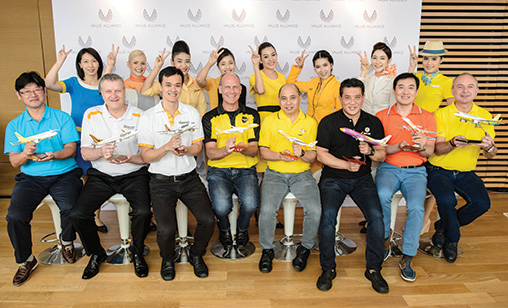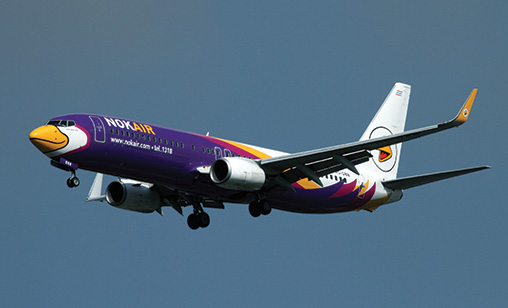Low-Cost Carriers
Stepping up the game
The Value Alliance, formed last month by eight Asia-Pacific low-cost carriers, is the world’s largest budget airline alliance. The new cross carrier partnership will add another layer of tension to the region’s increasingly competitive airline market.
June 1st 2016
Exuberant Nok Air chief executive, Patee Sarisin, has absolutely no doubts about the future of the new eight airline Value Alliance. “It’s going to be enormous,” he told Orient Aviation at its launch in Singapore last month. Read More » And while conceding it is at “the baby stage”, Patee has no doubts about the potential of Value.
“I’m going to approach some European ones (LCCs) to do this with us. The key element is to prove it works. Right now, we are putting in a whole lot of commitment to make sure that it does,” he said.
 |
It will be a long journey before the pan-Pacific budget alliance arrives where Patee ultimately wants it to be, but unlike the other members of the Value Alliance, he has some prior experience with airline partnerships, a factor that propels his enthusiasm for the partnership.
Bangkok-headquartered Nok and long haul LCC, NokScoot, has been live since February with ground-breaking technology that allows alliance members to dramatically increase their network reach and sell flights and ancillary products in markets where they have not had a presence.
“I’ll give you numbers,” he told Orient Aviation. “We started with NokScoot selling Nok Air tickets. Already, in our second month of operating with the new system, we are selling to 30,000 people. The sales are mostly to Chinese travellers coming into Thailand on NokScoot and transferring to Nok domestic flights.
“We are talking about a tremendous boost to our business and that is just from one airline. You can imagine what it will be like when other airlines are coming in from other places around Asia and doing the same thing.”
Value’s members are Nok Air, Cebu Pacific and its subsidiary Cebgo, South Korea’s Jeju Air, NokScoot, Singapore Airlines long-haul LCC subsidiary Scoot, Tigerair Singapore, Tigerair Australia and All Nippon Airways controlled Vanilla Air.
Between them, the alliance members have a fleet of 176 aircraft serving more than 160 destinations from 17 hubs. Combined, the eight airlines carried 47 million passengers last year.
Analysts interpret the establishment of the alliance as an attempt to break the market dominance of major LCCs: Malaysia’s AirAsia Group and Qantas’ stable of Jetstar carriers. The two groups hold around 15% and 9%, respectively, of the region’s budget passenger market.
By coming together, the Value Alliance hopes to mount an effective challenge to the market share of the two leading LCC groups.
The AirAsia group has about 200 aircraft spread among its eight carriers in Malaysia, Indonesia, Thailand, the Philippines and India and expects its Japan joint venture will be flying by October. The pioneering LCC group serves 120 destinations.
Jetstar, controlled by the Qantas Group, operates a fleet of 122 airliners and flies to 75 destinations from bases in Singapore, Australia, New Zealand, Japan and Vietnam.
“The alliance has been brought about by intense competition within the LCC segment”, said Shukor Yusof, head of Endau Analytics in Kuala Lumpur. “It is an innovative solution. The bottom line is to increase revenue”.
 |
“Even if the incremental gain is relatively small initially, it’s still a good ploy to get together and try to improve your distribution, brand awareness and to build some incremental traffic,” said the CAPA consultancy.
Ironically, although none of the alliance’s LCCs belongs to the International Air Transport Association (IATA), Value was formed as a result of IATA’s New Distribution Capability (NDC). The NDC is a major IATA project and is successfully establishing a new standard for the distribution and sale of airline products.
Based on NDC, UK-based Air Black Box (ABB) is the first company in the world to have developed the technology that allows customers to view, select and book the best available airfares on any alliance member airline in one transaction. The transactions can be done directly from the websites of each of the alliance’s airlines.
And unlike typical interline technologies, ABB enables its users, in a single itinerary, to view the full suite of ancillary options, including seat and meal selections, variable baggage allowances and other inflight offerings across all partner airlines.
ABB’s Air Connection Engine (ACE) platform has been certified at the first stage and is scheduled to receive full NDC certification later this year.
NDC strengthens distribution for airlines in their non-home markets, expands their saleable networks by interlining itineraries, retains their ancillary revenue opportunities and offers customers a better, one-stop shop experience.
For example, a Japanese traveller wanting to fly on different alliance member carrier from a secondary destination in Japan via Tokyo to Bangkok and on to a secondary destination in Thailand can book the entire journey, including ancillary purchases on Vanilla Air’s website.
The other big plus is that the technology is not expensive. “There is very little cost involved for individual airlines,” explained Scoot chief executive, Campbell Wilson. “The principle cost was developing the technology. Nok and Scoot contributed $1 million for that.
“We knew what we wanted to do, but the secret was ensuring the technology was not burdensome. The last thing you need is burdening cost. Once we cracked that, it was much easier to go out to airlines and say there’s only upside here.
| 'The ability to work with other carriers in the Value Alliance will be a big gain. We see that the traditional LCC model changes very rapidly. Point to point ancillary airport strategy doesn’t hold any more. It’s a regional hub strategy. This network, amongst the partners, not only brings very good value to us, but also fits in very well with our network strategy' |
| Cho Kyu Nam President and chief executive Jeju Air |
“Make a one-off investment in connecting into this technology, which we have developed, and then any sales that come are incremental revenue. It might not move the needle massively for you immediately, but what have you got to lose?”
Wilson, who is to return to Singapore Airlines from Scoot to take up a senior management role at the parent group, pointed out that in Southeast Asia almost 60% of airline seats are operated by LCCs.
“Yet most LCCs are not well known outside their home market. By bringing together our individual home market strengths, combined with our collective network, the Value Alliance offers travellers the convenience of transacting with an airline they know and trust and has proven its local market commitment. They also will enjoy a vastly broader network than any individual airline cannot offer alone. So from Australia to Japan, from Southeast Asia to the Middle East, LCC travel just became a whole lot more convenient.”
Vanilla Air president, Katsuya Goto, told Orient Aviation in Singapore: “The technology enables us to interface with other airlines within the Value Alliance, including those using different passenger service systems (PSS), to provide a solution to a guest’s travel query, even on routes Vanilla Air may not serve, to connect Japan to the rest of Asia-Pacific.”
Cebu Pacific president and chief executive, Lance Gokongwei, said the alliance is a clear example of how LCCs can accomplish more by working together than they can individually. President and chief executive of Jeju Air, Cho Kyu Nam, said the ability to work with other carriers in the Value Alliance will be a big gain.
“We see that the traditional LCC model changes very rapidly. Point to point ancillary airport strategy doesn’t hold any more. It’s a regional hub strategy. The network amongst the partners not only brings very good value to us, but also fits in very well with our network strategy.”
Goto said the most important gain is an expanded network that brings more opportunities and better selection for customers. “That is going to be the number one benefit. We have just started our operation, from December 2013, and are still young. This alliance will support our growth,” he said.
Tigerair Australia chief executive, Rob Sharp, said the partnership is a win-win for every Value Alliance airline and will deliver significant benefits for Tigerair Australia customers. “Tigerair Australia itself has only one overseas destination, Bali in Indonesia. But it can tap into traffic through Scoot, which flies to several Australian destinations, linking up with other Value members through Singapore,” he said.
“This is a major milestone that expands our existing network from 21 routes and 12 destinations to span one third of the world with more than 160 destinations across the Asia-Pacific.”
 |
| 'We think we’ve got the principle key markets covered with the exception of India and Indonesia. Vietnam is certainly an opportunity. In China, there are some opportunities that we are pursuing, but for the moment we have eight carriers, six countries and 17 hubs. That is the focus of making this work but we are always open to expansion' |
| Campbell Wilson CEO Scoot |
At this early stage, assessing the threat Value will present to the region’s established LLC groups is difficult. For now, although it may be possible at a later date, passengers can’t check their luggage through to their final destinations.
Nor is there a joint frequent flyer scheme or reciprocity mileage, services that the AsiaAsia Group and Jetstar offer across all their owned or part-owned subsidiaries
Membership of Value is “by invitation only” and it is clear AirAsia or Jetstar will not be invited to the alliance party. Most Value members are in fierce competition with Jetstar and AirAsia and their joint venture airlines so they do not intend to start interlining with them.
Rivals’ reactions to the alliance were muted. A Jetstar group spokesperson said that “when our customers travel on Jetstar they can be assured of a consistent brand and with it, the same product, level of service and flight experience across any of our airlines”.
Surprisingly, there has been no reaction to date from the normally talkative AirAsia group chief, Tony Fernandes, not even on his Twitter account.
The formation of Value was welcomed by a group which describes itself as the world’s first LCC alliance, the U-FLY Alliance. It is made up of four carriers from Greater China, all of which are majority-owned by the Mainland’s HNA Group.
Launched in January, its members are HK Express in Hong Kong, Lucky Air in Kunming, Urumqi Air in Urumqi and West Air in Chongqing. In a statement issued after Value was unveiled, U-FLY said: “the launch of this new alliance poses no threat to the competitive landscape. In fact, it will encourage creative collaboration and foster healthy growth in the LCC industry”.
As for the expansion of Value, it is expected to be some time before new members are recruited to the alliance. While Nok, NokScoot and Scoot are operating with the new technology, other Value members are still coming on line with the process scheduled for completion by year end.
“We think we’ve got the principle key markets covered with the exception of India and Indonesia,” said Scoot’s Wilson. “Vietnam is certainly an opportunity. In China, there are some opportunities that we are pursuing, but for the moment we have eight carriers, six countries and 17 hubs. That is the focus of making this work, but we are always open to expansion.”
Patee added that many of the 17 hubs reach into China. “Also, Cebu and Scoot operate to the Middle East. Already, the alliance has an extensive reach. We’ll bed the alliance down. We will get the software tools up and running and then see where to go from there. It’s very exciting. This is really a game changer for the industry.”